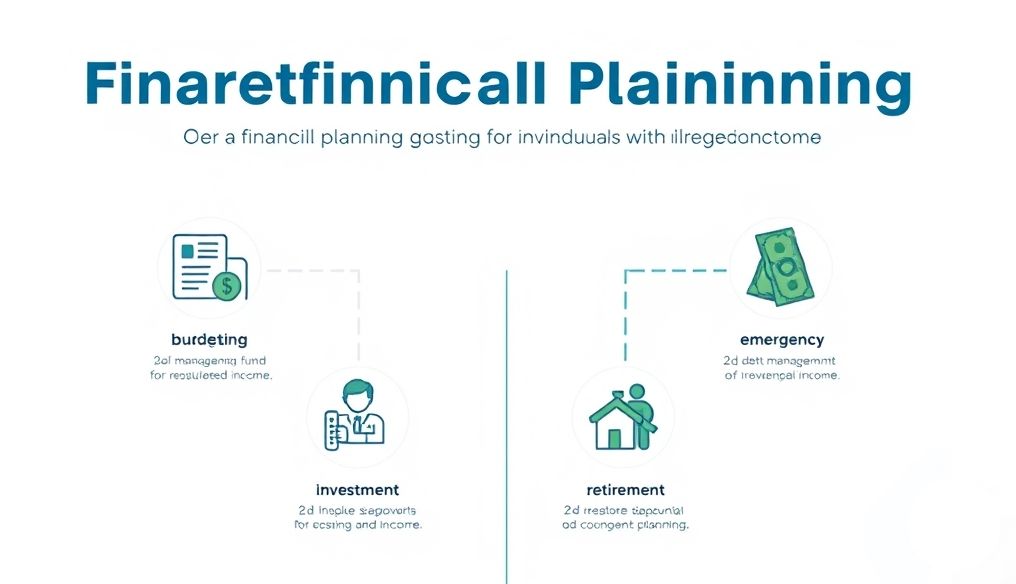Smart Financial Planning: How to Manage Irregular Income Effectively
Living with an irregular income can be a significant financial challenge. Whether you're self-employed, have a seasonal job, or rely on commissions, the constant changes in income require careful financial planning and effective strategies to manage your money. This article will equip you with the tools and knowledge you need to overcome these challenges and achieve financial stability.
Chapter 1: Understanding the Nature of Irregular Income
Before you start planning, it's essential to understand the nature of your irregular income. Analyze your different income sources and identify the periods when income is high and the periods when it is low. This analysis will help you set realistic expectations and plan your budget better.
Analyzing Income Sources
- Identify all income sources: Make a list of all your income sources, whether primary or secondary.
- Estimate average monthly income: Calculate your average monthly income over the past six to twelve months. This will give you a clear idea of your average income.
- Identify periods of high and low income: Identify the months or seasons when your income is higher or lower than average.
Forecasting Future Income
Based on your previous analysis, try to forecast your future income. Use historical data and current trends to estimate your income in the coming months. Be conservative in your forecasts, and it's better to underestimate income than to overestimate it.
Chapter 2: Creating a Flexible Budget
A budget is the foundation of sound financial planning. But when your income is irregular, you need a flexible budget that can be easily adjusted to suit changes in income. A flexible budget allows you to prioritize spending and allocate funds effectively.
Identifying Fixed and Variable Expenses
Start by identifying your fixed expenses, which are expenses that remain relatively constant each month, such as rent, loan payments, and insurance. Then identify your variable expenses, which are expenses that vary from month to month, such as food, entertainment, and transportation.
Prioritizing Spending
Rank your expenses by priority. Essential expenses such as housing, food, and healthcare should be at the top of the list. Then allocate funds to other expenses according to their importance and your ability to afford them.
Using Budgeting Apps
There are many budgeting apps available that can help you track your expenses and manage your budget easily. Some of these apps offer additional features such as tracking financial goals and receiving alerts when you exceed your budget.
Chapter 3: Building an Emergency Fund
An emergency fund is one of the most important tools to protect yourself from unexpected financial difficulties. The emergency fund should contain enough money to cover your basic expenses for at least three to six months. This fund will provide you with a safety net in case of loss of income or unexpected expenses.
Determining the Target Amount
To calculate the target amount for your emergency fund, estimate your average monthly basic expenses and multiply them by three to six months. For example, if your average monthly basic expenses are $1,500, you should have between $4,500 and $9,000 in your emergency fund.
Allocating a Portion of Income to the Emergency Fund
Allocate a portion of your monthly income to the emergency fund. Even if the amount is small, gradual accumulation will help you achieve your goal in the end. You can also allocate a portion of the extra income you earn in high-income periods to the emergency fund.
Keeping the Emergency Fund in a Separate Account
Keep the emergency fund in a separate account that is easily accessible but not linked to your daily checking account. This will prevent you from using the funds in the emergency fund for unnecessary purposes.
Chapter 4: Managing Debt
Debt can be a heavy burden on your budget, especially when your income is irregular. It is essential to manage your debts effectively to avoid falling into financial trouble. Evaluate your debts, develop a repayment plan, and avoid unnecessary borrowing.
Evaluating Debts
Start by evaluating your current debts. Make a list of all your debts, including the amount owed, the interest rate, and the minimum monthly payment. Rank your debts by interest rate, and start paying off the debts with the highest interest rate first.
Developing a Debt Repayment Plan
There are many strategies for repaying debts, such as the snowball method (paying off small debts first) and the avalanche method (paying off debts with the highest interest rate first). Choose the method that suits you and stick to it.
Avoiding Unnecessary Borrowing
Try to avoid unnecessary borrowing as much as possible. Before you borrow any amount, ask yourself if this debt is really necessary? And can you afford to repay it? If you are not sure, it is best to avoid borrowing.
Chapter 5: Planning for Retirement
Planning for retirement is essential regardless of the nature of your income. Even if your income is irregular, you can start saving for retirement by allocating a portion of your income in high-income periods. Invest in retirement plans that are right for you and take advantage of available tax benefits.
Setting Retirement Goals
Set your retirement goals. When do you want to retire? And what level of income do you need to live comfortably in retirement? These goals will help you determine how much you need to save.
Investing in Retirement Plans
Invest in retirement plans that are right for you, such as mutual funds, stocks, and bonds. You can also take advantage of retirement plans offered by the government or companies.
Taking Advantage of Tax Benefits
Look for retirement plans that offer tax benefits, such as Individual Retirement Accounts (IRAs) or 401(k) plans in the United States. These plans can help you save money on taxes and increase your retirement savings.
Chapter 6: Insurance
Insurance is a way to protect yourself and your family from unexpected financial risks. Make sure you have adequate insurance coverage to cover medical expenses, car accidents, property damage, and other potential risks.
Assessing Your Insurance Needs
Assess your insurance needs based on your financial situation, age, and health status. Make sure you have adequate insurance coverage to cover all potential risks.
Comparing Insurance Policies
Compare different insurance policies before purchasing. Look for policies that offer the best coverage at the lowest price. You can also consult an insurance broker to help you choose the right policy.
Reviewing Insurance Policies Regularly
Review your insurance policies regularly to make sure they still meet your needs. You may need to change your insurance policies as your financial or family situation changes.
Chapter 7: Investing
Investing is a way to increase your wealth in the long term. Even if your income is irregular, you can start investing in small amounts. Invest in assets that match your risk tolerance and financial goals.
Setting Investment Goals
Set your investment goals. Do you want to increase your wealth in the long term? Or are you looking for additional income? These goals will help you choose the right assets to invest in.
Diversifying Investments
Diversify your investments to reduce risk. Don't put all your money in one asset. Invest in a variety of assets, such as stocks, bonds, and real estate.
Investing for the Long Term
Investing is a long-term game. Don't expect to make quick profits. Be patient and stick to your investment plan for the long term.
Chapter 8: Managing Taxes
Managing taxes is an important part of financial planning. Make sure you understand local and national tax laws and that you pay your taxes on time. You can also take advantage of available tax deductions and exemptions to reduce the amount of taxes owed.
Understanding Tax Laws
Understand local and national tax laws. You can consult an accountant or tax advisor to help you understand these laws.
Keeping Accurate Records
Keep accurate records of all your income and expenses. These records will help you prepare your tax return correctly.
Taking Advantage of Tax Deductions and Exemptions
Look for tax deductions and exemptions available to you. These deductions and exemptions can help you reduce the amount of taxes owed.
Chapter 9: Developing Your Skills and Increasing Your Income
The best way to improve your financial situation is to increase your income. Develop your skills, look for new job opportunities, and start your own business. The more income you have, the easier it will be for you to achieve your financial goals.
Developing Skills
Develop your skills in areas that interest you. You can take training courses, read books, or attend conferences. The more skills you have, the more opportunities you have to get a better job or start a successful business.
Looking for New Job Opportunities
Look for new job opportunities. You can search online, network with your contacts, or attend job fairs. Don't be afraid to try new things.
Starting Your Own Business
If you have a good idea, consider starting your own business. This project may be the solution to achieving financial independence.
Chapter 10: Seeking Professional Help
If you are having difficulty with financial planning or managing your money, do not hesitate to seek professional help. A financial advisor can help you develop a personalized financial plan, manage your investments, and plan for retirement.
Finding a Qualified Financial Advisor
Find a qualified and licensed financial advisor. Make sure the advisor has experience dealing with people who have irregular income.
Discussing Your Financial Goals with the Advisor
Discuss your financial goals with the advisor. This will help him develop a personalized financial plan for you.
Following the Financial Plan Regularly
Follow the financial plan regularly with the advisor. This will help you make sure you are on track to achieve your financial goals.
Conclusion: Financial planning with irregular income requires careful planning, a flexible budget, an emergency fund, effective debt management, retirement planning, adequate insurance, smart investing, tax management, skills development, and perhaps professional help. By following these strategies, you can achieve financial stability and live with peace of mind regardless of income fluctuations.




